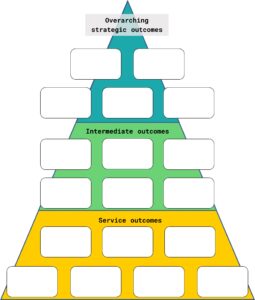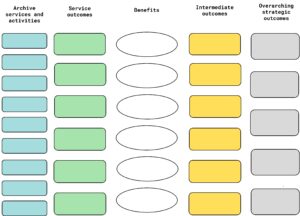Outcomes triangle
The outcomes triangle gives an overview of how archives can contribute at service, intermediate and overarching strategic outcome levels.

The outcomes triangle model
Outcomes could be:
Overarching strategic outcomes
- Improved mental wellbeing and greater social connectedness
- Reduction in health inequalities
- Increased personalisation, choice and control
- Older people more socially and mentally active
Intermediate outcomes
- More people exercising choice, managing their own wellbeing and care
- Reduction in people with mental ill-health and increased personal resilience
- More older people playing a full part in their local community as active citizens
- More people participating in learning, work or other mentally stimulating activities
Service outcomes
- Increased engagement by young people and adults with long term health conditions
- More people gaining new knowledge, skills and education through archives
- More people volunteering and involved in community life through archives
- New offerings developed working in partnership with health and wellbeing services/organisations
Logic model
The logic model illustrates the main links between service activities and local outcomes. This example suggest broad groupings of activities, benefits archives can offer to individuals, communities and places, and how these in turn contribute to the achievement of intermediate and overarching strategic outcomes.

A logic model template
Outcomes might be:
Archive activities
- Volunteering opportunities
- Training, employment and mentoring schemes
- Hosting targeted and special interest groups
- Knowledge and learning/skills courses and programmes
- Support for research activity
- Facilities and information provision
- Development and outreach work
- Events, sessions and clubs
Service outcomes
- More people volunteering and involved in community life through archives
- New offerings developed working in partnership with health and wellbeing services/organisations
- More people gaining new knowledge, skills and education through archives
- Increased engagement by young people and adults with long-term health conditions
Benefits
- Increased social interaction and new relationships
- Improved sense of well-being
- Increased knowledge, skills and qualifications
- Increased confidence, self-esteem, personal responsibility and resilience
Intermediate outcomes
- Reduction in people with mental ill-health, and increased personal resilience
- More older people playing a full part in their local community as active citizens
- More people participating in learning, work or other mentally stimulating activities
- More people exercising choice, managing their own wellbeing and care
Overarching strategic outcomes
- Improved mental wellbeing and greater social connectedness
- Older people becoming more socially and mentally active
- Reduction in health inequalities
- Increased personalisation, choice and control
Our section on ‘What to include‘ has more information about the outcomes triangle and logic model methods
Step two of ‘Creating your framework‘ features a step by step guide to creating an outcomes triangle and logic model